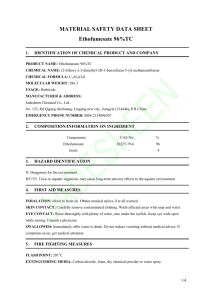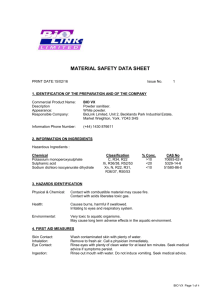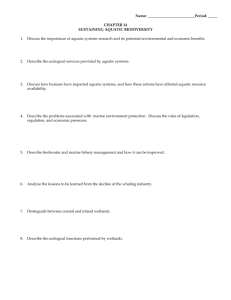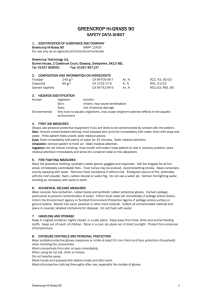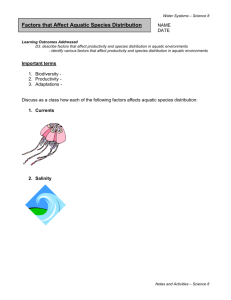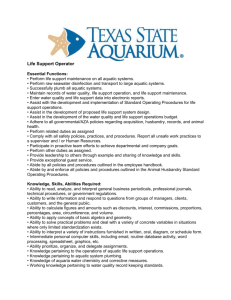EC safety data sheet ARCTIC MX-2
advertisement
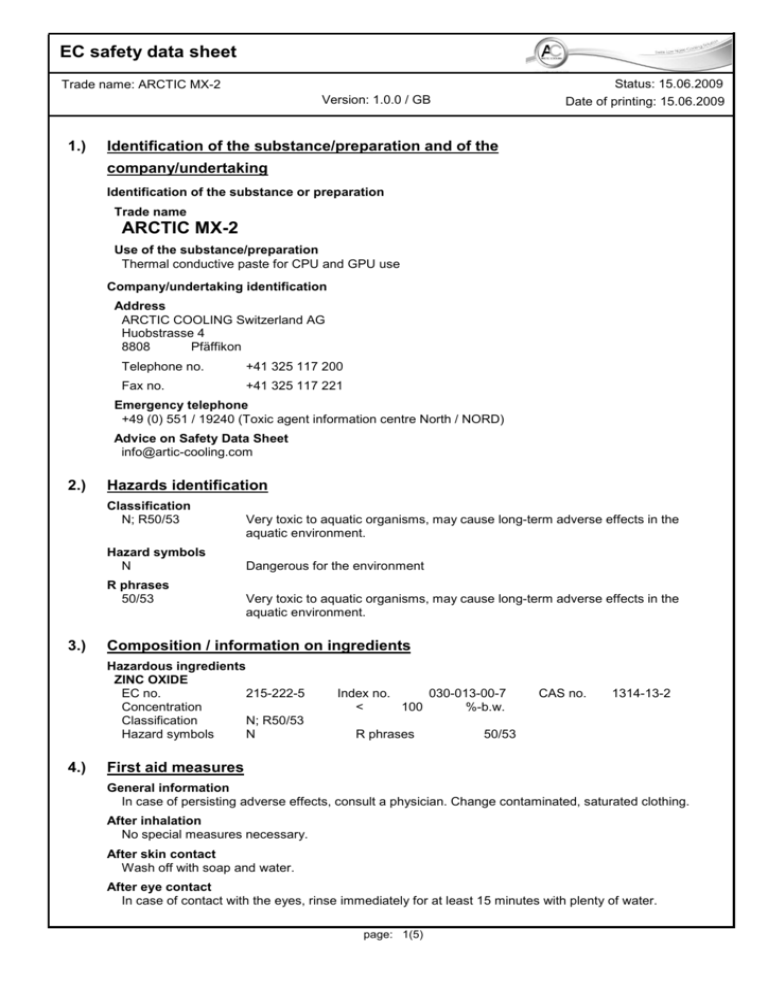
EC safety data sheet Status: 15.06.2009 Trade name: ARCTIC MX-2 Version: 1.0.0 / GB 1.) Date of printing: 15.06.2009 Identification of the substance/preparation and of the company/undertaking Identification of the substance or preparation Trade name ARCTIC MX-2 Use of the substance/preparation Thermal conductive paste for CPU and GPU use Company/undertaking identification Address ARCTIC COOLING Switzerland AG Huobstrasse 4 8808 Pfäffikon Telephone no. +41 325 117 200 Fax no. +41 325 117 221 Emergency telephone +49 (0) 551 / 19240 (Toxic agent information centre North / NORD) Advice on Safety Data Sheet info@artic-cooling.com 2.) Hazards identification Classification N; R50/53 Hazard symbols N R phrases 50/53 3.) Very toxic to aquatic organisms, may cause long-term adverse effects in the aquatic environment. Dangerous for the environment Very toxic to aquatic organisms, may cause long-term adverse effects in the aquatic environment. Composition / information on ingredients Hazardous ingredients ZINC OXIDE EC no. 215-222-5 Concentration Classification N; R50/53 Hazard symbols N 4.) Index no. 030-013-00-7 < 100 %-b.w. R phrases CAS no. 1314-13-2 50/53 First aid measures General information In case of persisting adverse effects, consult a physician. Change contaminated, saturated clothing. After inhalation No special measures necessary. After skin contact Wash off with soap and water. After eye contact In case of contact with the eyes, rinse immediately for at least 15 minutes with plenty of water. page: 1(5) EC safety data sheet Status: 15.06.2009 Trade name: ARCTIC MX-2 Version: 1.0.0 / GB Date of printing: 15.06.2009 After ingestion Seek medical advice immediately. Rinse mouth thoroughly with water. Never give anything by mouth to an unconscious person. 5.) Fire-fighting measures Suitable extinguishing media Foam; Carbon dioxide; extinguishing powder; Water spray jet Special exposure hazards arising from the substance or preparation itself, combustion products, resulting gases In the event of fire, the following can be released: Silicon dioxide Carbon dioxide (CO2) not combusted hydrocarbons Possibility of splitting off of small amounts of formaldehyde. Metal compounds Special protective equipment for fire-fighters Use self-contained breathing apparatus. Wear protective clothing. 6.) Accidental release measures Personal precautions Refer to protective measures listed in sections 7 and 8. Ensure adequate ventilation. Avoid dust formation. Keep away sources of ignition. Environmental precautions Do not discharge into the drains/surface waters/groundwater. Methods for cleaning up/taking up Pick up mechanically. When picked up, treat material as prescribed under heading "Disposal considerations". Additional informations (chapter 6) Risk of slipping due to leakage/spillage of product. 7.) Handling and storage Handling Advice on safe handling No special measures necessary if stored and handled as prescribed. Avoid the formation and deposition of dust. Provide good ventilation of working area (local exhaust ventilation, if necessary). Avoid eye, skin and clothing contact. Advice on protection against fire and explosion Dust can form an explosive mixture with air. Keep away from sources of heat and ignition. Storage Requirements for storage rooms and vessels Store product in closed containers. Advice on storage assembly Do not store together with oxidizing agents. Keep away from water. Protect against humidity Further information on storage conditions Keep container tightly closed and dry in a cool, well-ventilated place. Protect from direct sunlight. page: 2(5) EC safety data sheet Status: 15.06.2009 Trade name: ARCTIC MX-2 Version: 1.0.0 / GB 8.) Date of printing: 15.06.2009 Exposure controls / personal protection Exposure limit values ZINC OXIDE CAS no. EC no. 1314-13-2 215-222-5 Occupational Exposure Standards (OESs) / EH40 Zinc oxide, fume TWA 5 mg/m³ STEL 10 mg/m³ Personal protective equipment Respiratory protection If workplace exposure limits are exceeded, a respiration protection approved for this particular job must be worn. In case of dust formation, take appropriate measures for breathing protection in the event workplace threshold values are not specified. Hand protection In case of intensive contact, wear protective gloves (EN 374). Before use, the protective glove should be tested in any case for its specific work-station suitability (i.e. mechanical resistance, product compatibility and antistatic properties). Adhere to the manufacturer’s instructions and information relating to the use, storage, care and replacement of protective gloves. Protective gloves shall be replaced immediately when physically damaged or worn. Design operations thus to avoid permanent use of protective gloves. Eye protection Safety glasses (EN 166) Skin protection Clothing as usual in the chemical industry. General protective and hygiene measures Do not eat, drink or smoke during work time. Keep away from foodstuffs and beverages. Wash hands before breaks and after work. Have eye wash fountain available. Do not inhale dust. 9.) Physical and chemical properties General information Form Colour Odour grease grey odourless Important health, safety and environmental information Fire promoting Properties Oxidizing no Explosion limits Remarks Density Value 10.) not applicable 3,35 Stability and reactivity Conditions to avoid no data available Materials to avoid strong oxidizing agents page: 3(5) g/cm³ EC safety data sheet Status: 15.06.2009 Trade name: ARCTIC MX-2 Version: 1.0.0 / GB Date of printing: 15.06.2009 Hazardous decomposition products Formation of low quantities of formaldehyde is possible through degradation at temperatures above 150°C. Thermal decomposition Remarks 11.) No decomposition if used as prescribed. Toxicological information Experience in practice Inhalation of dusts may irritate the respiratory tract. Eye contact may cause mechanical irritation through dust particles. 12.) Ecological information Mobility Remarks The product is unsoluble in water. Other adverse effects Very toxic to aquatic organisms, may cause long-term adverse effects in the aquatic environment (manufacturer). 13.) Disposal considerations Product Allocation of a waste code number, according to the European Waste Catalogue, should be carried out in agreement with the regional waste disposal company. Packaging Residuals must be removed from packaging and when emptied completely disposed of in accordance with the regulations for waste removal. Incompletely emptied packaging must be disposed of in the form of disposal specified by the regional disposer. 14.) Transport information Land transport ADR/RID Class Packaging group Hazard id. no. Label UN number Technical name Danger releasing substance 9 Classification code M7 III 90 9 3077 Environmentally hazardous substance, solid, n.o.s. Zinc oxide Marine transport IMDG Class Packaging group UN number Proper shipping name EmS Label 9 III 3077 Environmentally hazardous substance, solid, n.o.s. F-A,S-F 9 Air transport ICAO/IATA Class Packaging group UN number Proper shipping name Label 9 III 3077 Environmentally hazardous substance, solid, n.o.s. 9 page: 4(5) EC safety data sheet Status: 15.06.2009 Trade name: ARCTIC MX-2 Version: 1.0.0 / GB 15.) Date of printing: 15.06.2009 Regulatory information Labelling in accordance with EC directives The product is classified and labelled in accordance with EC Directive 1999/45/EC. Hazard symbols N R phrases 50/53 S phrases 2 29 57 61 Dangerous for the environment Very toxic to aquatic organisms, may cause long-term adverse effects in the aquatic environment. Keep out of the reach of children. Do not empty into drains. Use appropriate container to avoid environmental contamination. Avoid release to the environment. Refer to special instructions / Safety data sheets. Council Directive 96/82/EC on the control of major-accident hazards involving dangerous substances Remarks Annex I, part 1 + 2: not mentioned. With regard to possibly appropriate decomposition products see Chapter 10. 16.) Other information Sources of key data used to compile the data sheet: EC Directive 67/548/EC resp. 99/45/EC as amended in each case. Regulation (EC) No 1907/2006 (REACH) as amended in each case. EC Directives 2000/39/EC, 2006/15/EC as amended in each case. National Threshold Limit Values of the corresponding countries as amended in each case. Transport regulations according to ADR, RID, IMDG, IATA as amended in each case. The data sources used to determine physical, toxic and ecotoxic data, are indicated directly in the corresponding chapter. Relevant R-phrases (chapter 3): 50/53 Very toxic to aquatic organisms, may cause long-term adverse effects in the aquatic environment. Department issuing safety data sheet UMCO Umwelt Consult GmbH Georg-Wilhelm-Str. 183 b, D-21107 Hamburg Tel.: +49 40 / 41 92 13 00 Fax: +49 40 / 41 92 13 57 e-mail: umco@umco.de This information is based on our present state of knowledge. However, it should not constitute a guarantee for any specific product properties and shall not establish a legally valid relationship. page: 5(5)
